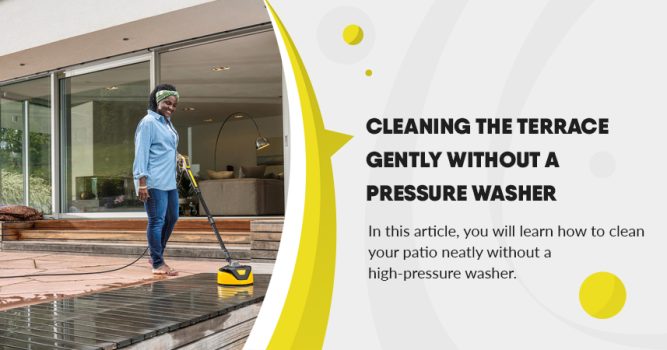

There are some floor coverings on the terrace that do not tolerate the water pressure from the high-pressure cleaner, or tolerate it poorly. To make cleaning effective without mechanical help, permanent care is very helpful. According to the motto “rather a little often” instead of “a lot at longer intervals”, a terrace can be kept amazingly clean.
Material-related and taste-related decisions
The question of whether a patio should be cleaned with or without a high-pressure cleaner is often answered by the type of covering. While paving stones can often withstand the high-pressure cleaner, wood, natural stone and WPC react rather sensitively to high force.
As with cleaning paving stones without a high-pressure cleaner, there are often advantages or disadvantages due to external factors, according to which individual decisions are made in each case. The following floor coverings must be cleaned on patios:
Concrete
Brushing and scrubbing are the two methods and curd or stone soap the means of choice.
More on the topic:
Porcelain stoneware
The fired surfaces of ceramic tiles are very easy to keep clean. As on other smooth surfaces, this is where the rubber lip scraper or water squeegee comes into its own.
Wood
Washing soda diluted in hot water is the ideal tool for brushing and scrubbing wood.
More on the topic: Cleaning and maintaining a wooden terrace
Natural stone
Natural stone is sensitive to acidic substances and cleaning with a high-pressure cleaner can damage its structure and substance. Especially soft stones such as marble, limestone, sandstone or terracotta.
WPC
WPC (Wood Plastic Composite) is a composite material consisting of wood fibres and wood flour and the plastics polyethylene (PE) or polypropylene (PP). The mixing ratio varies between twenty and fifty percent plastic content. They can generally be cleaned with a high-pressure cleaner. Their lower breaking strength compared to other coverings, including wood, can cause damage. Wipe damp to wet on WPC, as with other plastic decking.
Some of the popular and often recommended home remedies as patio cleaners are unsuitable and cause more harm than good. For many types of decking (except WPC), these include acidic and acidic substances such as vinegar and lemon juice.
More on the topic: How do I clean the WPC with a pressure washer or electric brush?
How to clean your patio neatly without a pressure washer?
-
Remove loose debris
Begin by removing any loose debris such as leaves, twigs, or dirt using a broom or a leaf blower. Sweep the entire terrace surface thoroughly to clear the area.
-
Prepare a cleaning solution
Fill a bucket with warm water and add a mild detergent or a terrace cleaner. Follow the manufacturer’s instructions for the recommended dilution ratio.
-
Scrub the surface
Dip a stiff-bristled brush or a deck brush into the cleaning solution. Start scrubbing the terrace surface in small sections, applying gentle pressure to remove dirt, stains, and grime. Pay extra attention to heavily soiled areas.
-
Use a scrubbing tool for stubborn stains
For stubborn stains like grease or oil, use a scrubbing pad or a nylon brush with a bit more pressure. Apply a little extra detergent directly to the stain and work it into the surface in a circular motion.
-
Rinse with clean water
Once you’ve scrubbed the entire terrace, rinse off the cleaning solution with clean water. Use a garden hose or buckets of water to thoroughly rinse the surface. Make sure no soapy residue remains.
-
Wipe or squeegee excess water
To speed up the drying process, use a mop, a squeegee, or absorbent towels to remove excess water from the terrace surface. This will help prevent water spots and promote faster drying.
-
Allow the terrace to air dry
Leave the terrace to air dry naturally. Open windows and doors, if possible, to enhance air circulation and expedite the drying process. Avoid walking on the terrace until it is completely dry.
-
Inspect and touch up if needed
Once the terrace is dry, inspect the surface for any remaining stains or spots. If necessary, spot treat these areas with appropriate cleaning products and repeat the scrubbing process.
-
Maintain the terrace regularly
To keep your terrace clean and well-maintained, sweep it regularly to remove debris and perform occasional gentle cleanings as needed. This will help preserve its appearance and prevent the buildup of dirt and stains.





.jpg)


